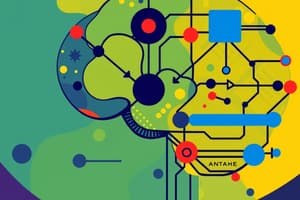Podcast
Questions and Answers
What is the primary purpose of an algorithm in computational thinking?
What is the primary purpose of an algorithm in computational thinking?
- To represent data visually for easy understanding
- To simplify the programming language used
- To provide a systematic way to solve a problem (correct)
- To randomly choose a solution to a problem
Which of the following best describes decomposition in computational thinking?
Which of the following best describes decomposition in computational thinking?
- Combining several problems into one large solution
- Ignoring parts of the problem to focus on the whole
- Breaking down complex problems into smaller, manageable parts (correct)
- Creating a final product without detailed steps
Abstraction in computational thinking is primarily used for what purpose?
Abstraction in computational thinking is primarily used for what purpose?
- To include more details in data analysis
- To eliminate unnecessary details and focus on essential features (correct)
- To simplify the entire process without any steps
- To create random patterns from data
When developing an algorithm, what is the significance of clear instructions?
When developing an algorithm, what is the significance of clear instructions?
In the context of computational thinking, how are decomposition and abstraction related?
In the context of computational thinking, how are decomposition and abstraction related?
Which of the following is an example of an everyday task that can be turned into an algorithm?
Which of the following is an example of an everyday task that can be turned into an algorithm?
What is a critical aspect of decomposition when developing an algorithm?
What is a critical aspect of decomposition when developing an algorithm?
Which option best describes what happens when abstraction is applied in algorithm development?
Which option best describes what happens when abstraction is applied in algorithm development?
In the context of algorithms, which statement is true regarding the relationship between decomposition and abstraction?
In the context of algorithms, which statement is true regarding the relationship between decomposition and abstraction?
Flashcards are hidden until you start studying
Study Notes
Computational Thinking and Algorithms
- Computational thinking involves breaking down problems to develop effective solutions.
- An algorithm is a step-by-step set of instructions designed to solve a specific problem.
Key Concepts
-
Decomposition:
- Process of breaking down complex problems into smaller, manageable parts.
- Helps to simplify tasks and identify necessary actions.
-
Abstraction:
- Focuses on the essential features of a problem while ignoring irrelevant details.
- Helps to concentrate on the key instructions needed for problem-solving.
Everyday Task Algorithms
-
Making Sandwiches:
- Gather ingredients (bread, filling, condiments).
- Place one slice of bread on a plate.
- Add filling on the bread.
- Top with another slice of bread.
- Cut sandwich if desired.
-
Brushing Teeth:
- Gather toothbrush and toothpaste.
- Wet toothbrush under water.
- Apply a pea-sized amount of toothpaste.
- Brush teeth for two minutes.
- Rinse mouth and clean toothbrush.
-
Doing Laundry:
- Sort clothes by color and type.
- Load washing machine with sorted clothes.
- Add detergent.
- Set washing cycle.
- Once completed, transfer clothes to dryer or hang to dry.
Identifying Abstraction Instructions
- In the sandwich-making algorithm, abstraction can be seen in the step "add filling" without specifying types—focusing on the action rather than specifics.
- In brushing teeth, "brush teeth for two minutes" abstracts the detailed method of brushing.
- In laundry, "sort clothes by color and type" abstracts various sorting processes into a simple instruction.
Studying That Suits You
Use AI to generate personalized quizzes and flashcards to suit your learning preferences.




